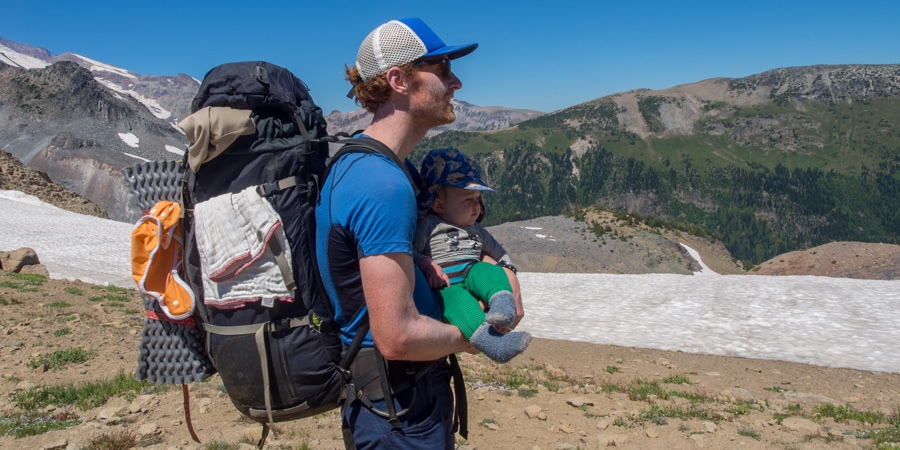Kids need to spend time outdoors—a fun, healthy, beyond-the-ordinary place. Backpacking is a great way to help them appreciate all the beauty and adventure that the natural world offers.
Here are some of our favorite tips for successfully taking kids (from about age 6 to 16) into the backcountry and keeping them excited about the experience.
Before You Go
- Rehearse: Introduce young legs to long-distance hiking with an extended walk (up to 2 hours) in a natural setting close to home. Advance to a half-day hike on a trail. To get them excited, tell them that these are special days when they get to use their made-for-hiking footwear. Let them carry their own pack (boys', girls')—just keep it light. On subsequent practice hikes, let them carry a little more weight.
- Start 'em young: The earlier in life kids become acquainted with walking longer distances (as early as age 3), the more likely they will be receptive to a backpacking trip at a later age.
- For the very young: When taking very small children on their first hikes, remind them that this is a "hike," not a "carry" by Mom and Dad. Kids should be expected to walk the entire time, but they get to call rest times when they feel tired. This puts the kids in charge to some degree, so parents should expect to cover less ground than planned.
- Simulate camping at home: Pitch a tent in the backyard or even inside your home. Let kids hang out in it and sleep in it overnight so they become comfortable with a new sleeping environment.
- Observe: Watch how kids react to new outdoor situations; adjust your pace and ambitions so the experience remains fun and not excessively challenging. Write yourself reminders to eliminate oversights on future trips (e.g., "pack sunscreen").
- Be enthusiastic: Why should kids get fired-up about an outdoor adventure if you're not?
- Involve kids in planning: Ask kids for ideas of possible things to do or see at your destination. Take their input seriously.
- Friends are valuable: It can be fun for kids to hike with another family that has kids. Yes, your children may get bored with you after a while.
- Check fire restrictions: Learn about campfire restrictions at your destination before you leave. (Fires are often banned in popular or high-elevation backcountry areas.) If they are not allowed, inform your kids in advance so they know what to expect. Instead, tell them you'll show them how your cool, tiny stove works.
In the Backcountry
- First time out? Choose a campsite destination not more than a mile or 2 from a trailhead. If for some reason you need to bail out, you won't have too many steps to retrace.
- Take a kid's perspective: Say your child spots an interesting insect along the trail. To you, it's just another beetle—you're thinking about the 2 more miles you need to hike to the lake. To your child, it's a really cool beetle—he's wondering why Mom or Dad is so worked up about getting to some lake. What to do? If your goal is to have your child associate backpacking with fun, at times it's good to adopt your child's priorities.
- Adjust your expectations: We've heard tales of families attempting difficult, off-trail backpacking expeditions. These can be tedious and exhausting for kids. If the trip is unpleasant, you run the risk of giving kids a negative impression of the outdoors, an attitude that can take a long time to reverse.
- Share the load: Give kids a kid-size pack and let them carry a few lightweight items. Snacks, water, a sleeping bag perhaps, or their rain gear. Adults, meanwhile, should play Sherpa for younger kids so the journey doesn't exhaust or discourage them.
- Self-sufficiency: Kids like to feel a degree of self-sufficiency. So, for example, give each child his or her own water bottle (or hydration system) so they can choose the time they want to drink.
- On the trail: If you have 2 or more adults in your party, it's usually smart to have one in the lead and one in the rear, with kids in the middle.
- Share chores: Enlist your child to take part in camp chores. Try asking your child to be in charge of keeping things neat and clean. Kids seem to grasp the concept of caring for nature more intuitively than adults, so this is usually one assignment that's a perfect fit for kids.
- Be safe: Make sure your kids always carry a whistle (teach them to blow it if they become separated from you) and have easy access to a flashlight or headlamp. For the younger ones, attach a lanyard to both the whistle and light and tie them to one of the child's belt loops.
Teachable Moments
- Open-air classroom: Carry field guides (or use a mobile app) so you can identify the flora, fauna, rocks, birds or clouds your kids encounter along the way.
- Trail history: Some trails have historical significance or interesting stories. This information is often available in trail guides, at ranger stations or via mobile apps, and can add another dimension of interest and learning to your trip.
- Leave No Trace: Acquaint kids with Leave No Trace principles to help them mature into responsible citizens and caring stewards of the outdoors.
- Navigation: A backpacking trip is a great way to introduce kids to navigating with a map and compass, and also with a GPS receiver. Your example can impress on your kids the importance of understanding basic navigational skills in the backcountry. They might even take an interest in orienteering or geocaching, a pair of outdoor activities based on navigation skills.
- Wildlife: Ask at the ranger station about wildlife activity in the area you are visiting. As the adult, you need to understand any precautions necessary (such as proper food storage or how to react during an up-close encounter) for safely coexisting with wildlife. Educate your children about treating wildlife with respect and caution so everyone stays safe.
Rewards of Backpacking with Kids
How kids gain from backpacking excursions:
- Exercise; good health.
- Growth in self-sufficiency, independence, confidence.
- Family camaraderie in a memorable setting.
- Fresh air; a prolonged escape from urban distractions.
- A growing knowledge and appreciation of nature.

